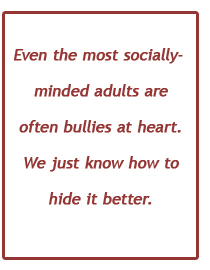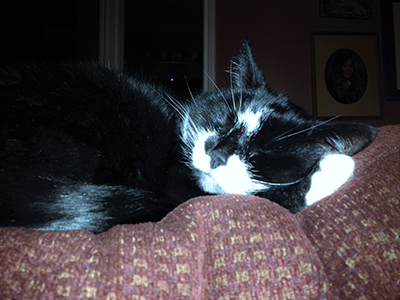 Ever felt like you were living a lie? Washington, US teen Gaby Rodriguez did it for six months during her senior year at her small-town high school. And while most people lie to fit in or to hide an embarrassing secret, the straight-A student turned the concept on its head.
Ever felt like you were living a lie? Washington, US teen Gaby Rodriguez did it for six months during her senior year at her small-town high school. And while most people lie to fit in or to hide an embarrassing secret, the straight-A student turned the concept on its head.
As Good Morning America reported, Gaby faked a pregnancy, enduring six months of whispers and stares in order to perform a social experiment. The truth was known by only a handful of people (including her mother, principal, and boyfriend?but not her friends or even all of her siblings). When Gaby presented her project, she made the big reveal: she wasn’t pregnant, and her growing ?baby bump? was a cleverly placed pillow. And then she showed the students a compilation of words, names, and attitudes that had filtered back to her over the duration of her ?pregnancy.?
What a great?and telling?experiment. We’ve heard before how cruel kids can be, and most of us can remember some time during elementary or high school when we were on the receiving end of the taunts and laughter. Nowadays, the ease of communication?think Facebook and smart phone video cameras?make it more of a problem than ever.

Bullying among kids and teens is a particularly hot-button issue right now, as the media has picked up on several tragic stories of youth suicides. But even under the radar, incessant teasing, labelling, and a host of cruel pranks continue to destroy hope in the tormented.
Pundits, parents, educators, and social commentators point fingers, attempting to assign blame for the spate of incredible nastiness That’s appearing among kids, teens, and even college students. Yet, as they so often do, they usually miss the wider picture.
Yes, modern technology makes it easier and faster to humiliate victims. Yes, there are poor examples in the media. Yes, some kids really do get away with anything. But the problem is deeper, because the attitudes that destroy victims? lives aren’t exclusive to a crowd of mean girls or pushy jocks. In fact, they’re shared by many, many adults, even the most open-minded and outwardly tactful.
We just know how to hide it better.
It’s ironic that in this so-called age of tolerance we make so many subtle character judgments that most of the time we don’t even realize what we’re doing. We think we’re socially correct, but frequently anybody whose choices and values are different from our own is fair game for snap judgments and ill thoughts.
Celebrities whose big mouths and hurtful statements have gotten them into trouble are frowned upon by society. And rightly so, but at the same time, I can’t help wondering whether we’re being a bit hypocritical. After all, are we truly any better?
Have you ever looked at the shopping cart being pushed by an obese guy, and raised an eyebrow at the chips, pop, chicken wings, and other unhealthy fare? And then thought, Geeze, no wonder he’s so fat. Maybe he should lay off the doughnuts for a while.
Or looked askance at the family with seven kids: Irresponsible parents, haven’t they ever heard of birth control?
What about when a kid gets in trouble with the law? Where are the mom or dad? Lousy parents, should be punished themselves if they can’t they supervise their 13-year-old better.
We do it every day, constantly, the mental filth filtering through our brains as fast as we interact with people. What an incompetent moron! My boss is such a pompous windbag. That slowpoke is way too old to be driving. Without knowing the whole story. Without understanding the person or the decision. With only our remote insight into the situation, we feel we know more, see more, are infinitely superior.
Let’s not even get started on the political and ideological sphere. They say that politics brings out the worst in an individual, but I don’t think it only applies to politicians. The fact is, political, religious, and ideological values are often very closely held and very personal to us. Anyone who disagrees, even indirectly and by virtue of supporting a different ideology, we perceive as a threat. It’s increasingly apparent as the elections approach how easy it is to slip into venomous thoughts when our only disagreement with the holders is their beliefs or values.
So let’s take a step back and examine our own bullying tendencies. Maybe that man is making unhealthy eating choices. Maybe those parents should have restricted their teen’s media consumption. Maybe there was no valid reason for their choices. Maybe they messed up, made mistakes. Haven’t we? The mark of a mature mind is to turn away from gossip?even when the nonverbal duality of our brains is the only negative conversation going on.
Most of us adults have outgrown the need to verbally taunt another’s perceived inferiority. And fortunately, most of us will never go on drunken rants that betray our inner bully. But it doesn’t mean that It’s not there, and it doesn’t mean that It’s not damaging.
We are all connected. And even if we don’t say something mean, or give a rude stare, or act aloof, mental bullying chips away little by little at the bonds which unite humankind?those bonds which some say separate us from animals. Our unkind thoughts destroy us a little inside each time. And the more we think of people as lesser, beneath us, the more we become just a little less human.


